Latin America Space Roundup: 4 to 17 July 2025
A summary of all the space news in Latin America over the past two weeks, brought to you by AzurX

The following are the major space developments in the Latin American region tracked by Latin America Space Monitor over the past two weeks:
Argentina Space Developments
Argentina and India Discuss Space and Satellite Cooperation During Modi Visit
During Prime Minister Narendra Modi’s visit to Buenos Aires, Argentina and India reaffirmed their strategic partnership with a strong emphasis on expanding space cooperation. Building on their long-standing collaboration - beginning with the Indian Space Research Organisation’s (ISRO) 2007 launch of Argentina’s first satellite - the leaders pledged to deepen joint efforts in satellite technology and space exploration. The talks also covered critical minerals, including lithium for battery production, and highlighted India’s NavIC satellite navigation system as a model for technological innovation. The visit underscored satellite and space collaboration as key pillars of bilateral engagement, aligned with broader goals in trade, energy, and digital infrastructure.
Argentina and U.S. Defense Ministers Discuss Cooperation in Space Operations & Initiatives
In a significant step toward revitalizing U.S.–Argentina defense ties, Defense Secretary Pete Hegseth and Argentine Defense Minister Luis Petri met to advance cooperation in space operations, critical minerals, and South Atlantic security. Emphasizing joint space initiatives, the meeting reflects both countries’ strategic alignment under the Trump and Milei administrations and highlights Washington’s broader effort to counter foreign influence in Latin America through enhanced defense and space collaboration.
Argentina’s NBRaINS Team Selected by NASA for Lunar Recycling Solution
Argentina’s NBRaINS team, part of environmental firm Benito Roggio Ambiental (BRa), has been named one of 17 global winners in NASA’s LunaRecycle Challenge for its prototype that recycles nitrile and polyethylene gloves into 3D printer filament - aimed at supporting closed-loop manufacturing on lunar missions. Selected from over 1,200 entries worldwide, the recognition highlights Argentina’s emerging role in space sustainability innovation. BRa’s decade-long R&D focus on waste valorisation now bridges Earth and space, reinforcing the relevance of scalable, circular technologies for future Artemis habitats and extreme environments.
Gallus Communications Enters Argentina’s Market With LEO SATCOM Solution
Gallus Communications has entered the satellite market in Argentina - traditionally dominated by Starlink - with a pioneering mobile satellite emergency network developed alongside local partner Servicio Satelital S.A. Unlike standard satellite internet offerings, Gallus’s low-Earth orbit (LEO)-based system leverages Push-to-Talk over Cellular (PoC) technology to deliver real-time voice, video, and geolocation communications in areas without power or terrestrial infrastructure. Designed for critical use by emergency responders and infrastructure sectors, the modular, infrastructure-independent solution marks the first of its kind in Argentina and signals Gallus’s intent to expand across Latin America amid intensifying competition from Starlink, Amazon’s Project Kuiper, Orbith, and INSAT.
Bolivia Space News
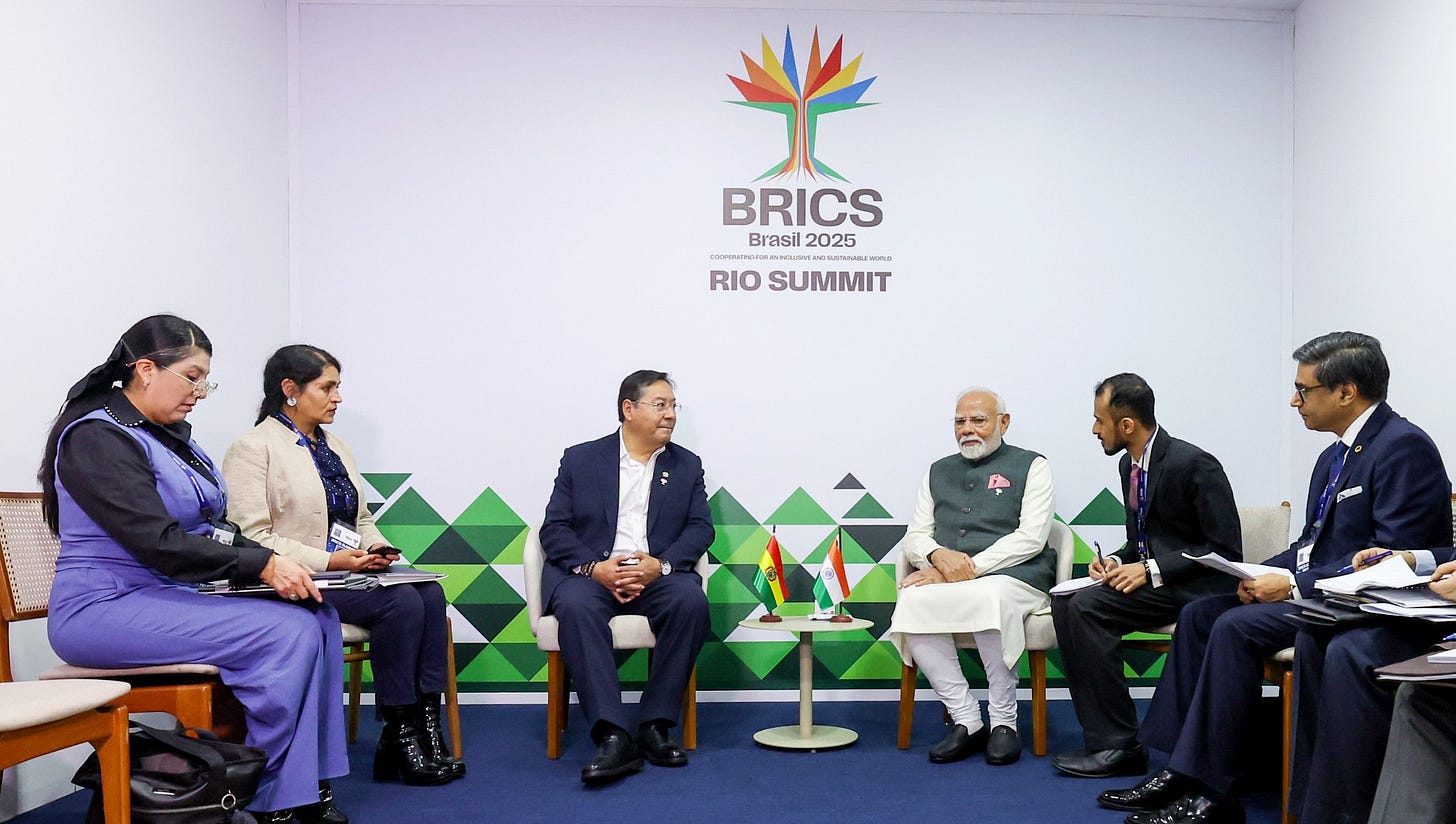
Bolivia and India Discuss Space Cooperation on Sidelines of BRICS Summit
On the sidelines of the BRICS Summit, Prime Minister Narendra Modi met with Bolivian President Luis Arce and emphasized expanding cooperation in space, critical minerals, digital infrastructure, and trade. Both leaders acknowledged growing bilateral ties and discussed sustainable partnerships, particularly in space and digital technologies, with capacity-building as a key pillar. The meeting reaffirmed space as a strategic area for India–Bolivia collaboration, complementing India’s broader push to deepen Latin American engagement across high-tech sectors.
Bolivia and China Set to Deepen Space and Satellite Cooperation
As China and Bolivia mark 40 years of diplomatic relations, space and satellite cooperation stand out as key pillars in their evolving strategic partnership. With Bolivia’s recent accession to BRICS, the two countries are poised to deepen collaboration in scientific and technological domains, including China's advanced space capabilities and Bolivia's aspirations for sovereign satellite and telecommunications development. China's leadership in satellite technologies and space exploration offers Bolivia critical opportunities to strengthen its digital infrastructure, remote sensing, and environmental monitoring, while joint participation in international research and knowledge networks could accelerate Bolivia’s integration into the global space economy. This growing cooperation reflects not only a shared commitment to human development but also an emerging alignment in space-sector ambitions within the broader South-South technological ecosystem.
Bolivia Represented at Russian University’s Space Education Program
At the 2025 edition of the Bauman Moscow State Technical University’s International Youth Scientific School “Space Development: Theory and Practice,” Bolivian postgraduate student Michael Quispe from the Moscow Aviation Institute represented Bolivia among a cohort of over 150 global participants. Quispe emphasized the program’s value in advancing space education and expressed hopes to bring similar initiatives to Bolivia or Latin America. The event fosters collaboration on advanced aerospace projects - this year focusing on designing a long-term habitable base in Venus's atmosphere - and highlights Bolivia’s growing engagement in international space science and talent development.
Brazil Space Developments
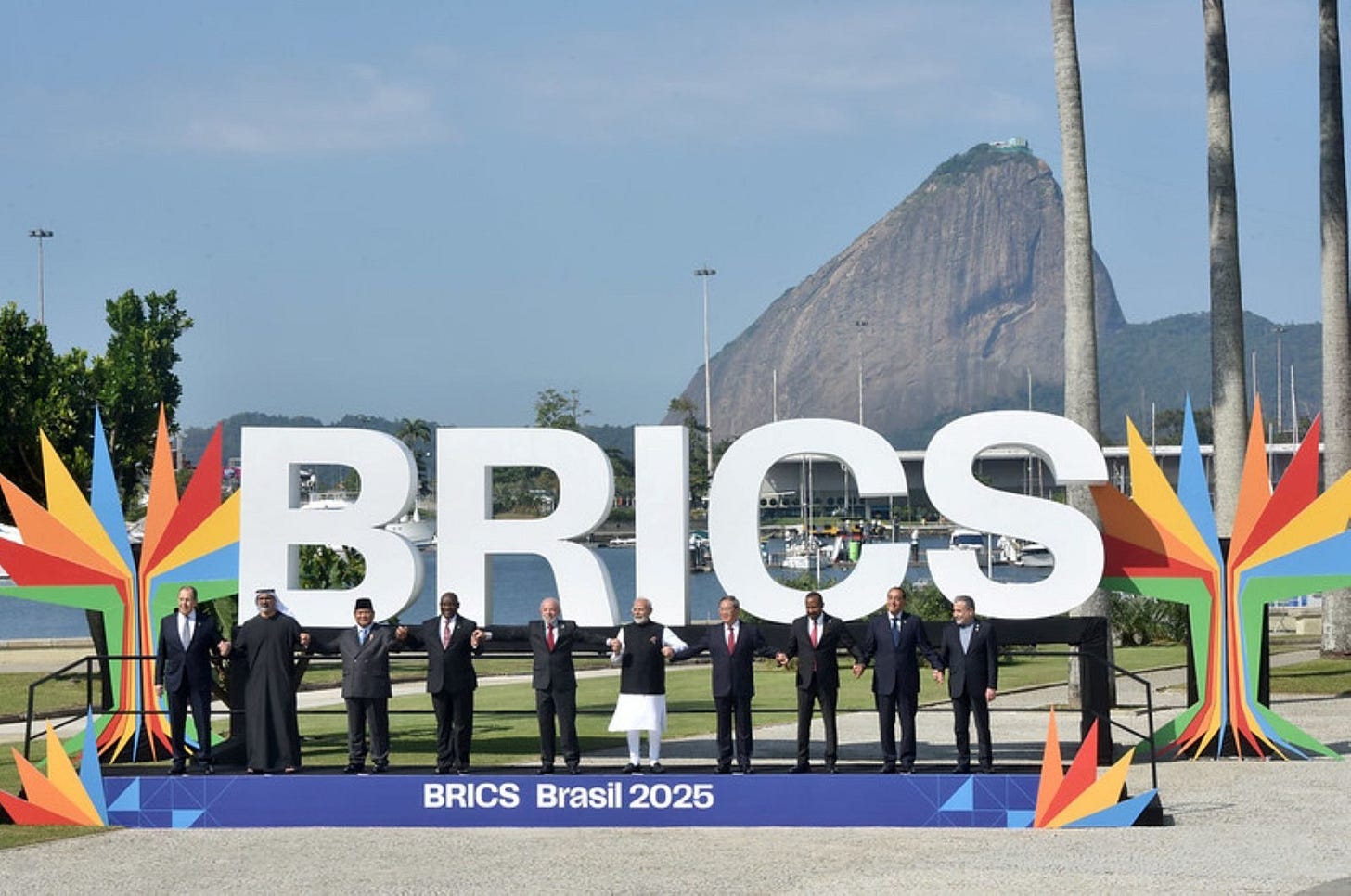
BRICS Member States, Including Brazil, to Create BRICS Space Council
At the 2025 BRICS Summit, hosted and presided by Brazil, leaders agreed in principle to establish a BRICS Space Council, signalling a formal step toward deeper collaboration in space activities. The declaration reaffirmed the bloc’s commitment to the peaceful use of outer space for the benefit of all countries and called for intensified cooperation in satellite navigation, remote sensing, and space-based technologies. Importantly, BRICS emphasized reducing internal disparities in space capabilities to support shared sustainable development goals.
Brazil and India to Join Efforts in Satellite Tracking & Peaceful Uses of Space
During Prime Minister Narendra Modi’s state visit to Brasília following the 17th BRICS Summit, India and Brazil reaffirmed their growing strategic cooperation in space, underscoring joint efforts in satellite tracking and the peaceful use of outer space - building on India’s 2021 launch of Brazil’s Amazonia-1 satellite. These developments reflect a deepening of bilateral collaboration across advanced technologies, with new agreements expected to enhance coordination in renewable energy, counterterrorism, and confidential data exchange, alongside continued convergence on space-related goals through platforms like BRICS and the Global Biofuel Alliance.
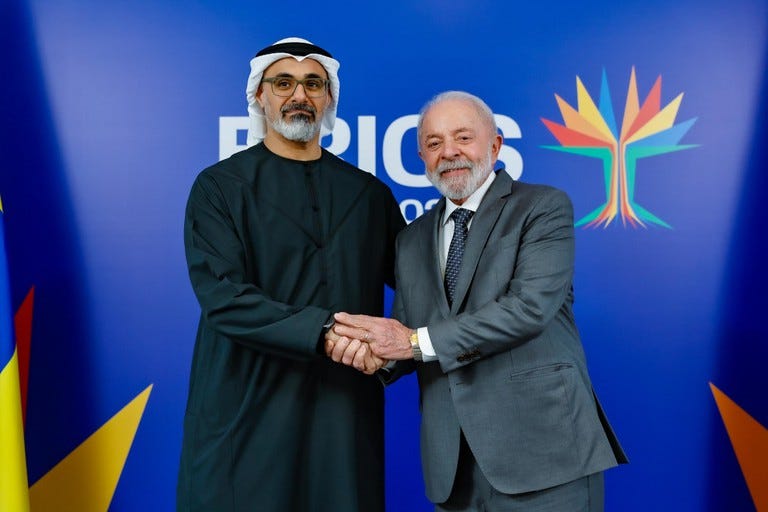
Brazil and the UAE Discuss Cooperation, Including in Satellite Communications
During a bilateral meeting at the BRICS Leaders’ Summit on 5 July 2025, Brazilian President Luiz Inácio Lula da Silva emphasized Brazil’s interest in deepening cooperation with the UAE across strategic sectors, notably satellite communications and submarine cable infrastructure. Lula highlighted these areas as key investment opportunities, alongside renewables and petrochemicals, and underscored Brazil's commitment to finalizing a MERCOSUR–UAE trade agreement by year-end. The talks also addressed joint initiatives in digital technologies, including AI and language models, situating satellite communications as a core pillar in broader efforts to enhance bilateral technological and economic integration.
Brazil and Nigeria Strategic Partnership Includes Cooperation on Earth Observation
At the BRICS Summit, Brazilian President Lula da Silva and Nigerian President Bola Tinubu reaffirmed their strategic partnership with a focus on expanding cooperation in space observation, science, and innovation. The leaders discussed collaborative opportunities in satellite-based Earth monitoring as part of a broader agenda that includes energy transition, infrastructure, and agricultural productivity. These efforts align with Nigeria's reform priorities and Brazil’s emphasis on leveraging space capabilities for sustainable development and geopolitical engagement across the Global South.
Brazil and China Sign Deal for Development of CBERS-5 GEO Satellite
Brazil and China have finalized an agreement to jointly develop the CBERS-5 satellite - the first geostationary satellite in the long-standing China–Brazil Earth Resources Satellite (CBERS) program. Signed during the BRICS Summit, this milestone elevates Brazil into the small group of countries capable of producing geostationary satellites. CBERS-5 will support critical national priorities such as climate resilience, agriculture, and energy, while also serving the broader Latin American and Caribbean region with open-access environmental and meteorological data.
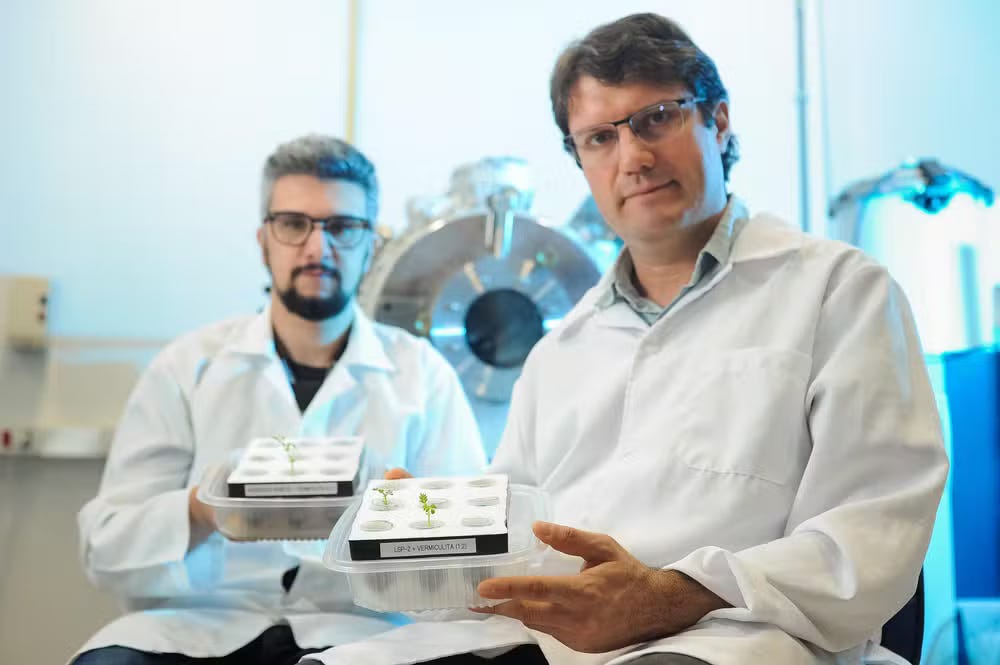
Brazil’s Embrapa Launches Space Agriculture Initiative
Brazil has launched an ambitious space agriculture initiative through the Embrapa-led Space Farming Brazil network, uniting 56 researchers from 22 institutions - including USP, INPE, and international partners - to investigate food production in extraterrestrial environments. Using simulated lunar regolith, current experiments focus on chickpeas and sweet potatoes to support NASA’s Artemis program objectives, while also developing resilient crops for Earth’s climate-challenged regions. The initiative, catalyzed by Brazil’s 2021 signing of the Artemis Accords, reflects the country's growing role in space research and its potential to contribute to lunar and Martian habitation through sustainable agricultural technologies.
Spain’s Sateliot to Expand LEO IoT Satellite Services to Brazil Later in 2025
Spain’s Sateliot, operator of the world’s first 5G NB-IoT satellite constellation in LEO, is accelerating its deployment plans with five new satellites from Spanish firm Alén Space and preparing to launch commercial service in Brazil. With a 100+ satellite roadmap validated by 3GPP and €270 million in global client commitments, Sateliot aims to deliver secure, hybrid IoT connectivity across sectors like agriculture, mining, and logistics. Following a recent spectrum licence from Brazil’s Anatel, Sateliot will offer seamless roaming between terrestrial and satellite networks using standard SIM-based IoT devices, targeting nationwide coverage in partnership with local mobile operators.
Wyld Networks & Myriota Partner to Provide LEO Satellite IoT in Brazil
Sweden’s Wyld Networks and Australia’s Myriota have entered a strategic partnership to deploy low-cost, low-power satellite IoT services using LEO constellations, with initial deployments focused on soil monitoring in Brazil and the U.S. Leveraging Myriota’s UltraLite network and Wyld’s configurable satellite IoT modems, the collaboration enables robust sensor integration for remote agricultural applications via SDI-12 and RS-485 protocols. The initiative supports scalable, real-time environmental data collection in areas without cellular coverage, marking a significant step in advancing precision agriculture and IoT connectivity across Latin America and beyond.
Chile Space News
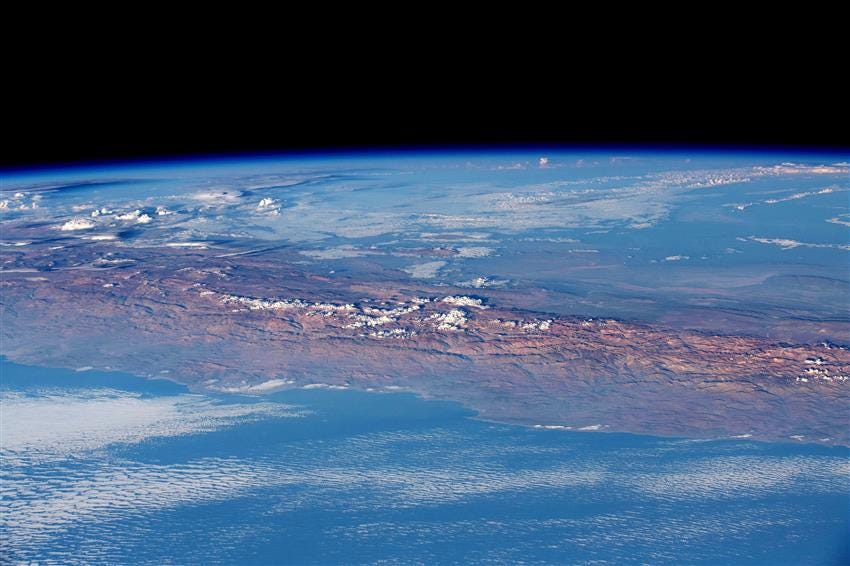
Chile-Based LATAM Signs $60 Million Deal With Viasat for SATCOM Inflight Connectivity
LATAM Group, headquartered in Chile, has signed a $60 million deal with Viasat to equip over 60 of its widebody aircraft with next-generation, multi-orbit inflight connectivity (IFC) using Ka-band satellite technology. This upgrade - leveraging Viasat’s GEO satellites and future integration with Telesat’s Lightspeed LEO constellation - will enhance connectivity on long-haul routes across Australia, Europe, North America, and remote regions like the South Pacific. Installation begins in 2026 and complements LATAM’s existing Intelsat-powered IFC on short- and medium-haul flights, with added operational benefits such as real-time crew communications, predictive maintenance, and route optimization.
Cuba Space Developments
Starlink’s Direct-to-Cell Satellite Service Spurs Device Seizures in Cuba
SpaceX’s Starlink has launched its Direct to Cell (DTC) satellite internet service for mobile phones as of July 2025, beginning with T-Mobile users in the U.S. and offering connectivity in areas without terrestrial coverage. Most smartphones released in the past four years are compatible, with no special hardware required. While access in Cuba remains unconfirmed, the potential has stirred interest and concern amid reports of device seizures by Cuban authorities. This development marks a major step in expanding satellite internet accessibility via mobile, though device compatibility and regulatory barriers may limit adoption in regions like Cuba.
French Guiana Space News
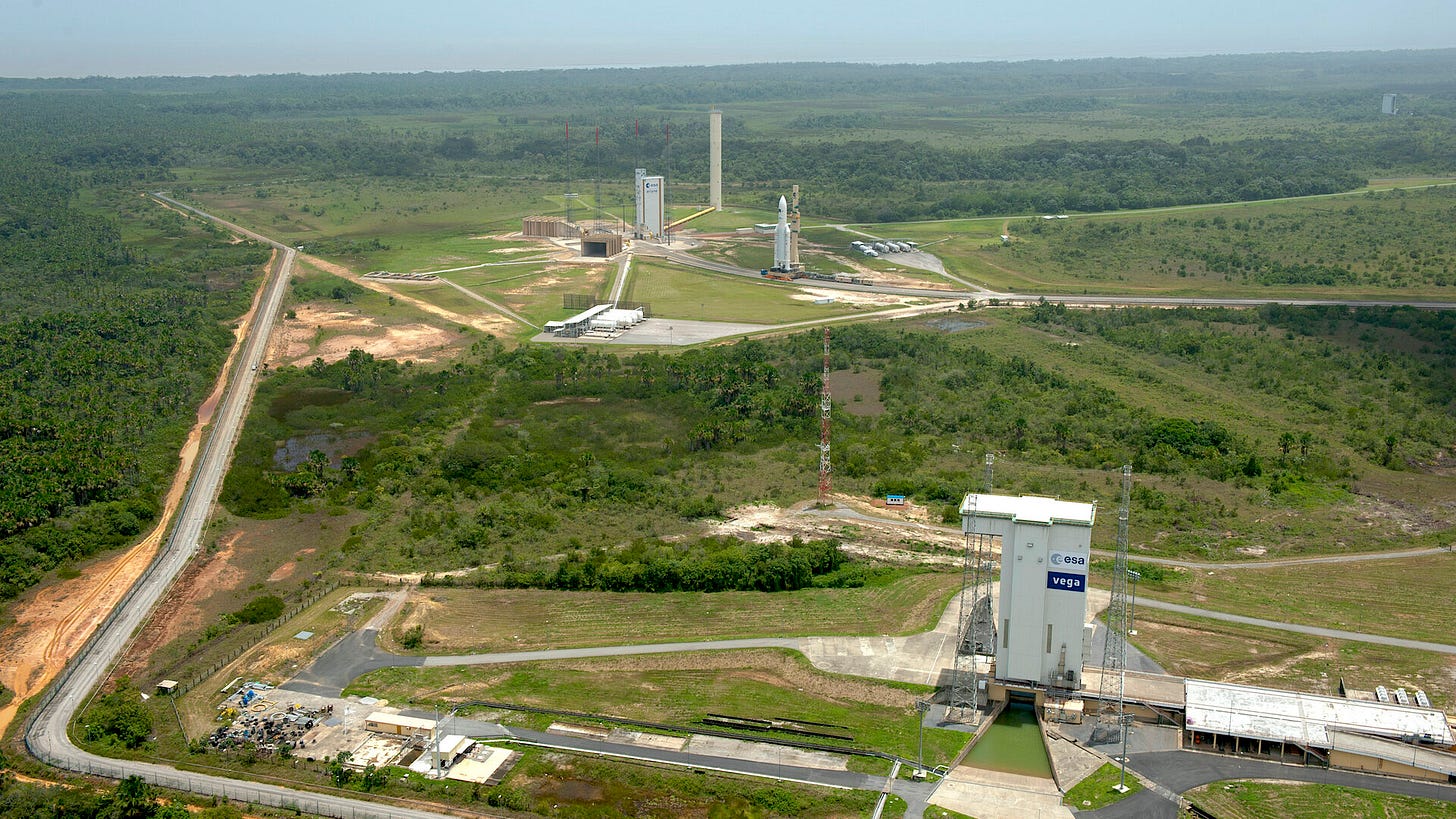
French Guiana’s Space Centre Undergoes Major Governance & Operational Overhaul
The Guiana Space Centre (CSG), in French Guiana, Europe's primary launch site for over 45 years, is undergoing a major governance and operational overhaul to accommodate the continent’s growing space economy and new launch service providers. A revised framework includes strategic committees, streamlined access for emerging players, and a dedicated launch pad for the European Launcher Challenge, all designed to position CSG as a competitive, multi-user spaceport. The European Space Agency (ESA) has also been mandated to renegotiate exploitation agreements for Ariane-6 and Vega launch vehicles, reinforcing CSG’s pivotal role in Europe’s space access strategy.
Spain’s PLD Space Commits to French Guiana for MIURA-5 SLV Operations
Spain’s PLD Space has formally committed to establishing its MIURA-5 launch operations at the Guiana Space Center (CSG) in French Guiana, aiming to create 56 jobs and begin launches by 2026, scaling to 30 missions annually by 2030. In a presentation attended by French Guianese and CNES officials, the Spanish company outlined its vision to become Europe’s leading small launch provider, leveraging CSG’s equatorial location for fuel-efficient, heavy-payload missions. The initiative promises significant economic and educational impact locally, with planned knowledge transfer programs and supply chain partnerships, while contributing to Europe’s strategic space autonomy through sustainable, reusable launch capabilities.
French Guiana: Arianespace Set to Launch Five Earth Observation Satellites on 25 July
Arianespace is set to launch the Vega-C VV27 mission from French Guiana on 25 July 2025, carrying Airbus Defence and Space’s CO3D constellation and CNES’s MicroCarb satellite into Sun-synchronous orbit. The CO3D mission, a partnership between Airbus and CNES, comprises four dual-use Earth observation satellites delivering 50 cm stereo and 2D imagery for military and civil applications. MicroCarb, developed by CNES with Airbus and Thales Alenia Space UK, will measure global CO₂ concentrations to support climate science. This marks Arianespace’s 354th mission and underscores Europe’s growing role in precision EO and environmental monitoring.
Guyana Space Developments
Guyana Looks to Acquire Satellite Technologies for National Defense Purposes
Guyana is advancing into the space and satellite domain as part of its national defence modernization strategy, with President Irfaan Ali announcing ongoing negotiations to acquire satellite technologies and aerospace defense systems. At the commissioning of a €2.9 million Italian-made Tecnam P2012 utility aircraft, Ali emphasized that space-based assets, including satellite ownership and data sovereignty, are becoming critical to safeguarding national security. The Guyana Defence Force (GDF) is aligning its air, land, and marine capabilities for full-spectrum interoperability, supported by a dramatic budget increase and the establishment of an aviation school to train military and commercial pilots—positioning Guyana as a regional leader in aerospace readiness and response.
Mexico Space News
Mexico’s Aeromexico Equips Embraer E190 Fleet With Viasat IFC SATCOM
Mexico’s Aeromexico is equipping its Embraer E190 fleet with Viasat’s next-generation Amara in-flight connectivity (IFC) system, marking a major expansion of its longstanding partnership with the satellite communications provider. Six of 34 aircraft are already upgraded, with full fleet coverage expected by 2027. This move positions Aeromexico as the first Latin American airline to offer ad-supported free messaging across its entire network and enhances its digital strategy for short-haul connectivity. The upgrade follows February’s announcement to retrofit its 787 Dreamliners with Viasat IFC, further embedding satellite connectivity into Aeromexico’s operational and customer experience roadmap.
Venezuela Space Developments
GLONASS Ground Station in Venezuela Formally Commissioned by Russia
Russia’s Roscosmos has officially commissioned a GLONASS ground station in Venezuela, marking a strategic expansion of Russia’s global navigation satellite system in the Western Hemisphere. The station will enhance GLONASS’s regional accuracy and support applications across Venezuelan aviation, emergency services, precision agriculture, geodetic surveying, and critical infrastructure monitoring. The inauguration also paves the way for broader bilateral cooperation in satellite manufacturing, ground infrastructure, space technology applications, and workforce development, positioning Venezuela as a key Latin American partner in Russia’s space ambitions.
Other Regional Space News
Opinion: Many Latin American Countries Reject U.S. Space Governance Approach
Writing in Frontiers, Sibsankar Palit, Thiago S. Dias, and Subhajit Hazra argue that as Latin America deepens its engagement with space governance, countries like Bolivia - now a BRICS member - are increasingly vocal in calling for outer space to remain a global commons, resisting the trend of commercial and military dominance led by major powers. Recent initiatives and partnerships highlight a growing desire among Latin American states to access space technologies for sustainable development, including satellite-based services for agriculture, disaster monitoring, and education. Regional collaboration models, such as shared satellite systems in South America, demonstrate how countries in the Global South are building frameworks for inclusive space participation. However, governance remains skewed, with countries like the U.S. rejecting global commons principles through measures like the Artemis Accords and national executive orders. The Latin American perspective - rooted in principles of environmental law and equity - pushes for binding international treaties, fair benefit-sharing, and technology transfer mechanisms to ensure that space resources benefit all countries, not just the technologically advanced few. As the geopolitical landscape shifts, Latin America's leadership in inclusive space dialogue will be vital to shaping a sustainable, multipolar space order.
Be sure to catch up with space activities in the region in the next edition of Latin America Space Monitor’s space roundup!











